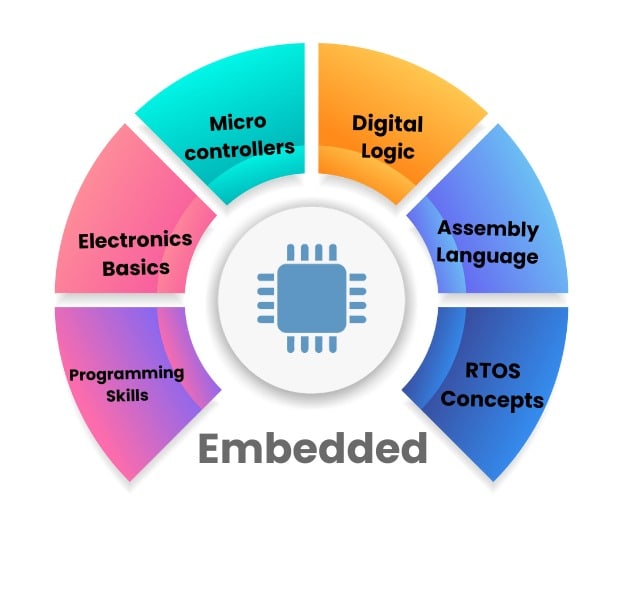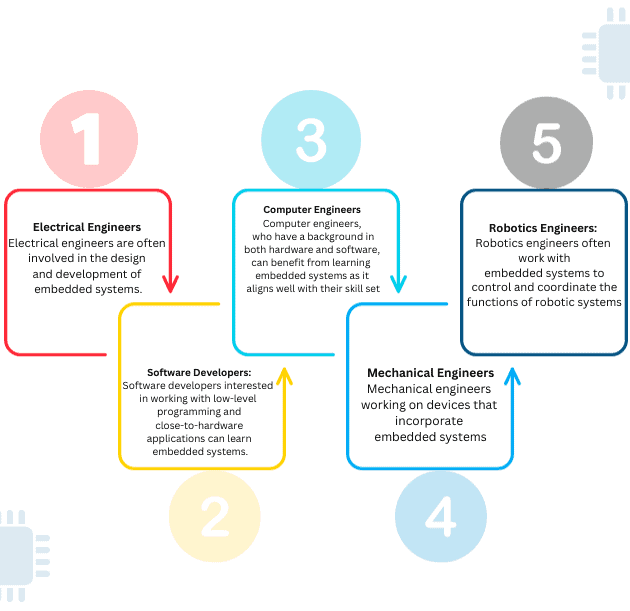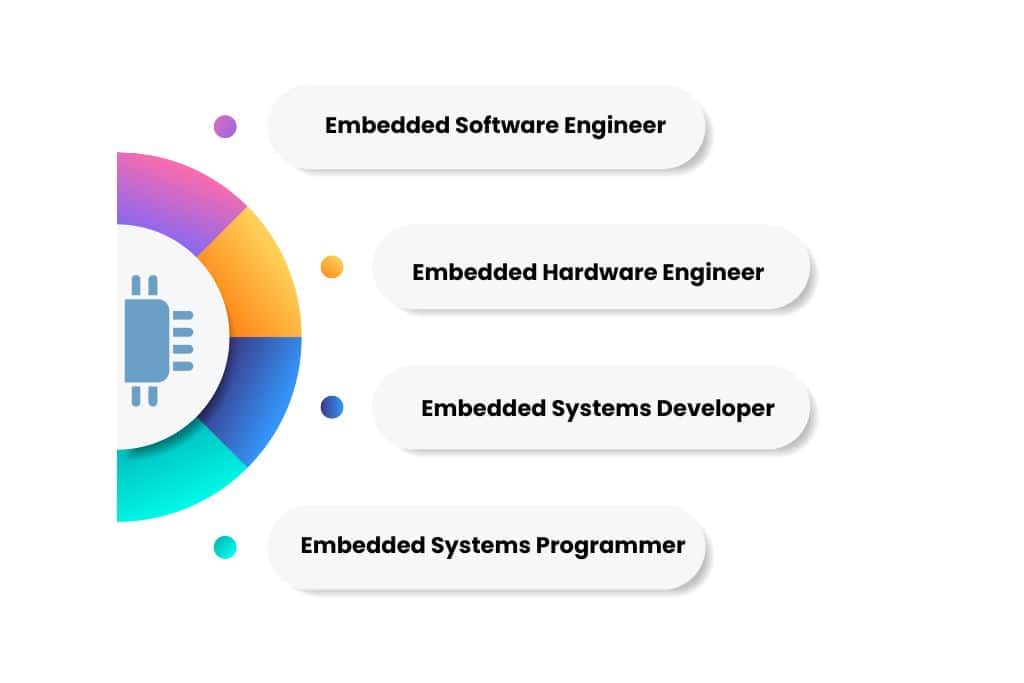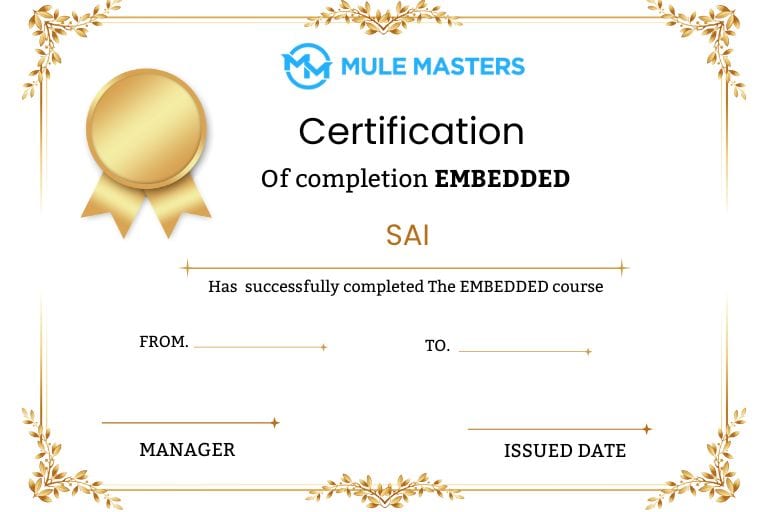Embedded Course In Hyderabad
- Daily Class Recordings
- 15+ Years Expert Trainer
- 100% Placement Assistance
- Realistic Scenarios Training
- Resume Preparation Guidance


Table of Contents
ToggleEmbedded course in Hyderabad
| Trainer Name | Mr. Vamsi Raju |
| Trainer Experience | 15+ Years |
| Next Batch Date | 25-01-2024 (8:00 AM IST) |
| Training Modes: | Online Training (Instructor Led) |
| Course Duration: | 90 Days |
| Call us at: | +91 9640 539 509 |
| Email Us at: | mulemasters.in@gmail.com |
| Demo Class Details: | Click here to chat on Whatsapp |
Course Topics
o Features of C
o History
o Structure of C Program.
o Keywords, Identifiers, Variables and Constants
o Primitive Data Types.
o Aggregated Data Types.
o Binary Operators
o Unary Operators
o Ternary Operators
o Special Operators
o Order of evaluation.
o Role of Functions
o Passing arguments to functions
o Returning values from functions
o Recursive Functions
o Callback functions
o Implications on Stack
o Pass by value/reference
o Defining, initializing and using arrays
o Multi Dimensional arrays
o Arrays of Characters and Strings
o Arrays and pointers
o Passing arrays to functions
o String handling and its library functions
- Scope and lifetime of a variable
- Internal
- External/Global
- Automatic
- Static
- Register
- Volatile
o Usage of Structures
o Declaration, initialization and accessing
o Nested Structures
o Array of structures
o Allocation of memory and holes
o Unions
o AND (&), OR (|), XOR (^)
o Compliment (~)
o Left-shift (<<), Right-shift (>>)
o Masking, Setting and Testing of Bit/Bits
o The purpose of pointers
o Defining pointers
o The & and * operators
o Pointer assignment
o Pointers with functions
o Pointer to Pointer
o Pointers to Arrays
o Arrays of Pointers
o Void Pointers
o Call By value and Call by reference
o Advanced pointer types
o Pointers to functions
o Pointers and Strings
o Pointers and Dynamic memory
o Allocation (Malloc, Calloc, Realloc)
o De-Allocation(Free)
o Implementation of printf()
o Implementation of scanf()
o Introduction
o Linked Lists
o Stacks & Queues
o Stacks Using Arrays
o Stacks Using Linked List
o Queues using Arrays
o Queues using Linked List.
o Circular Queues
o Single Linked List
o Circular Linked List
o Double Linked List
o Infix, Prefix and Postfix Expressions
o Trees
o Binary Trees
o Binary Search Trees
o Graphs
o Hashing
- Insertion sort
- Selection sort
- Bubble sort
- Merge sort
- Quick sort
- Heap sort
- Linear search
- Binary Search
o Concept of a FILE data type
o File Input, Output operations
o Sequential Files
o Random Access Files
o Fopen,Fread,Fwrite,Fclose,Fseek
o Relationship between file descriptor
o and FILE pointer
o Character at a time I/O
o Line at a time I/O
o Formatted I/O
o In Ascii format
o In Binary format
o Modifying a structure in the file
o In Ascii format
o In Binary format
o Modifying a structure in the file
o Vi editor
o GCC compiler
▪ Four Stages of GCC
● Functionality of Preprocessor
● Functionality of Compiler
● Functionality of Assembler
● Functionality of Linker
▪ Interrupting the Compiler
▪ Compiling a C Program
▪ Preprocessor Features
▪ Predefined Preprocessor Symbols
Learning of operating system concepts will help you in understanding Desktop, Embedded & Real-time
Operating Systems easily in less time.
● Introduction
● Processes
● Threads
● CPU Scheduling
● Process Synchronization
● Deadlocks
● Memory management
● Virtual Memory.
● File management & Disk management
o Library Goals
o Library Standards
o GNU C Library – glibc
o Library Functions vs. System Calls
o Using System Calls
o Handling Errors with errno
o Making Sense of errno
o Using strace
o Program Startup
o Using argc/argv
o Handling Options with getopt()
o Handling Options with getopt_long()
o Environment
o Manipulating the Environment
o Program Exit
o Registering Exit Handlers
o Why Use Libraries?
o Static Versus Shared
o Static Library Benefits
o Shared Library Benefits
o Creating a Static Library
o Using Static Libraries
o Creating a Shared Library
o Using Shared Libraries
o Shared Library Management
o Library Locations
o ldconfig
o When Does Time Begin?
o Time Data Types
o Determining Real Time
o Converting time_t
o Converting tm Structure
o Process Time
o Time arithmetic
o Second Resolution Timers
o Fine-Grained Timers
o Real Time Clock (RTC)
o What a Process Is
o Process Relationships
o Create a Child Process
o Doing Something Else
o Related execve() Functions
o Wait For a Child
o More Precise Waiting
o Changing Priority/Nice
o Real Time Priority
o Allocating/Freeing Memory
o Memory Alignment
o Locked Memory
o Memory Copy/Initialization
o Memory Comparison/Search
o What Is My Program Doing?
o Source Level Debugging
o Invoking gdb
o Getting Started with gdb
o Examining and Changing Memory
o Debuginfo Libraries
o Using gdb with a Running Process
o Using gdb to Autopsy a Crash
o Debugging Libraries – ElectricFence
o Debugging with valgrind
o Profiling for Performance
o Stream vs. System Calls
o Opening/Closing Streams
o Stream Input/Output Functions
o Stream Status/Errors
o Stream File Positioning
o Stream Buffering
o Temporary/Scratch Files
o Opening/Closing File Descriptors
o File Descriptor I/O
o Repositioning File Descriptors
o Stream/File Descriptor Conversions
o cat using ANSI I/O
o cat using POSIX I/O
o Introduction to Pipes
o Standard I/O: popen()/pclose()
o Using popen()/pclose()
o System Call: pipe()
o Using pipe()
o Named Pipes
o Using Named Pipes
o For Further Reading
o What Signals Are
o Blocking/Checking Signals
o Working with Signal Sets
o Example of Blocking Signals
o Handling Signals with sigaction()
o sigaction() Example
o Handling Signals with signal()
o Sending Signals
o Introducing Threaded Programming
o Applications Suited to Threads
o Building Threaded Programs
o Creating Threads
o Thread Identity
o Synchronizing by Joining
o Detaching Threads
o Stopping Threads
o Synchronizing with Mutexes
o Using Mutexes
o Read/Write Locks
o Conditional Variables
o Using Conditional Variables
o Directory Operations
o File System Operations
o Multiplexed I/O with select()
o Miscellaneous I/O Functions
o Memory Mapped I/O
o Using Memory Mapped I/O
o File Locking
o Interprocess Communication (IPC)
o POSIX IPC Overview
o POSIX Shared Memory
o POSIX Semaphores
o POSIX Message Queues
o System V IPC Overview
o System V IPC Shared Memory
o System V IPC Semaphore Arrays
o System V IPC Message Queues
● Programmer's view of hardware
● CPU
● Types of CPUs
● CPU Characteristics
● CPU Bus/Machine Cycles
● Memory
● Memory types
● CPU Memory interface
● I/O
● I/O controllers
● CPU I/O interface
● I/O methods/techniques
● Polled I/O or Programmed I/O
● Interrupt Support
● DMA Support
● Host-Target Environment
● Cross compilers
● Downloading methods
● Serial, Ethernet, Floppy, ROM
● Emulators
● Target based debugging
● Debug Monitors
● Host based source level debugging
The ARM is a 32-bit reduced instruction set computer (RISC) instruction set architecture (ISA) developed by ARM Holdings. It was known as the Advanced RISC Machine. The ARM architecture is the most widely used 32-bit ISA in terms of numbers produced. The relative simplicity of ARM processors made them suitable for low power applications. This has made them dominant in the mobile and embedded electronics market, as relatively low cost, and small microprocessors and microcontrollers.
As of 2005, about 98 percent of the more than one billion mobile phones sold each year use at least one ARM processor. As of 2009, ARM processors account for approximately 90% of all embedded 32-bit RISC processors. ARM processors are used extensively in consumer electronics, including PDAs, mobile phones, digital media and music players, hand-held game consoles, calculators and computer peripherals such as hard drives and routers.
● Introduction to ARM (ARM7/ARM9)
● ARM processor architecture & Features
● ARM programming model (Instruction set and assembly language programming).
● RISC vs. CISC
● Pipelining concept
● Fundamentals of ARM
● Processor modes
● Exception Handling
● ARM versions
● Instruction Set & Addressing Modes
● ARM(32-bit) Instruction Set
● Thumb(16-bit) Instruction Set
● Pre & Post Indexed Addressing modes
● Stack Orgranization
● Memory Organization
● Mixed C and assembly programs
● System Design & Development Tools
● Case studies on ARM Controllers
After Gaining knowledge on Advanced Linux Programming you are ready to learn Device Drivers.
This is where you learn core of Linux Kernel and system programming.
● Introduction to Device Drivers
● Module Programming
● Kernel Configuration and Compilation
● Character Drivers
● Kernel Features
● Interrupts and Exceptions
● More on Modules
● Debugging
● Timers
● Synchronization techniques
● ioctl's
● The proc filesystem
● Unified Device Model and sysfs
● Memory Management and Allocation
● User and Kernel Space communication
● Sleep and Wait Queues
● Interrupt Handling
● Block Drivers
● PCI
● Direct Memory Access
● Network Drivers
● USB Drivers
● MTD
● Asynchronous I/O
● I/O Scheduling
● Introduction to Networking
● Need/Uses of Networking
● Use of Layered architecture
● OSI Protocol layers
o Physical layer functionalities
o Data link layer functionalities
o Network Layer functionalities
o Transport layer functionalities
o Presentation layer functionalities
o Session layer functionalities
o Application layer functionalities
● TCP/IP protocol layers
● Line configurations
● Network topologies
● Networking and internetworking devices
● LAN, MAN, WAN
● Typical media and Protocols used in each
● LAN Standards
● Ethernet, Token Ring, Token Bus, FDDI
● Ethernet Media (Thick, Thin, Twisted pair)
● Ethernet frame formats
● WAN Standards
● Dial-up, Leased Line
● ISDN, DSL, PPP
● ATM
● TCP/IP Stack Internals:
● Internet Addresses concepts.
● IP Address vs H/W address (unicast/broadcast/multicast).
● Subnetting/Supernetting.
● Switching
● ARP/RARP
● Internet Protocol (IP)
o IP Concepts
o ICMP
o Routing concepts
o Autonomous systems
o Routing Algorithms
o Routing protocols
o Interior/Exterior routing protocols.
o Unicast/Multicast Routing protocols
o IGMP
o User datagram Protocol (UDP)
o Transmission Control Protocol (TCP)
o Socket concepts
o Socket API Interface
o Client VS Server
o Connectionless and connection oriented client-server communication.
o Socket calls for UDP/TCP server/client
o Iterative vs concurrent servers
o Iterative Connection-less servers (UDP)
o Iterative Connection-Oriented servers (TCP)
o Concurrent server implementation
o TFTP
o SMTP
o HTTP
o BOOTP
o DHCP
o Ethereal
o WireShark
● What is RTOS?
● Desktop OS vs. RTOS
● RTOS Key Characteristics
● RTOS Services
● Task Management
o Inter task Communication Methods
o Synchronization Techniques
o Interrupt handling
o Timers
o Signals and Events
o Priority Inversion/Inheritance
Embedded Course in Hyderabad
Key Points

Real Time Expert Trainers
Mule Masters Institute one of the best training institutes which boasts a team of highly experienced and knowledgeable instructors specializing in Embedded Systems, ensuring top-notch education.

Hands-On Training
The Mule Masters training institute prioritizes practical learning, providing hands-on experience with real-world Embedded System projects to enhance students’ skills.

Industry-Relevant Curriculum
The Embedded Systems course is crafted to meet industry standards, covering the latest technologies and trends in the field to make students job-ready.

Placement Assistance
Mulemasters Institute is committed to helping students succeed in their careers. The institute provides dedicated placement assistance to connect students with job opportunities in the Embedded Systems industry.

Project-Based Learning
Emphasis is placed on project-based learning, allowing students to apply theoretical knowledge in practical scenarios, fostering a deeper understanding of Embedded Systems concepts.

Flexible Batch Timings
Mulemasters Institute understands the diverse needs of its students and offers flexible batch timings, making it convenient for working professionals and students alike.

Certification Program
Upon successful completion of the Embedded Systems training, students receive a recognized certification from Mulemasters Institute, validating their proficiency in Embedded System.

Continuous Evaluation and Feedback
Regular assessments and feedback sessions are conducted to track students’ progress, ensuring a supportive learning environment and helping individuals address their strengths and weaknesses.

Interactive Learning Resources
Mulemasters Institute provides access to a variety of interactive learning resources, including simulation tools and online platforms, to enhance the learning experience and reinforce theoretical concepts.
What is Embedded course ?
- Foundational Brilliance: With our immersive Embedded Systems training in Hyderabad, set the stage for mastery by learning how to seamlessly combine hardware and software for unmatched performance.
- Microcontrollers Redefined: Learn about the complexities of microcontroller architectures and gain the ability to select and set up parts according to certain uses.
- Real-time Wizardry: Our state-of-the-art embedded course places a strong emphasis on controlling real-time operating systems (RTOS) to develop systems with clockwork precision.
- Code Craftsmanship: Develop your proficiency with low-level programming languages to write code that maximizes system performance and is a powerhouse.
- Project Pinnacle: In our engaging embedded course in Hyderabad, advance your abilities through practical projects that ensure practical mastery.
- Industry-Leading Efficiency: By using best practices, Embedded systems can be created that are more reliable, efficient, and require less maintenance than others.
Embedded Course in Hyderabad
Objectives
The objectives of an Embedded Systems course are like a roadmap for students to explore the fascinating world of tiny computer systems hidden in everyday devices. Here are six key points to help you understand what this course aims to achieve

- Students will learn the fundamental concepts of Embedded Systems, starting from the ground up.
- It's not just theory; students get to tinker with real hardware and write code to make things work.
- The course nurtures problem-solving skills, teaching how to design efficient and reliable systems for various applications.
- Students are encouraged to think creatively and invent new applications for Embedded Systems, like smart gadgets or medical devices.
- Collaboration is key, as students often work in teams to build complex Embedded Systems projects.

Pre-Requisites of the Embedded Course
- Basic Programming Knowledge: Familiarity with languages like C or C++ is often required, as these are commonly used in Embedded Systems development.
- A grasp of basic Electronics concepts, such as circuits, components, and microcontrollers, can be beneficial in understanding how Embedded Systems work.
- Problem-Solving Skills: As Embedded Systems often involve troubleshooting and optimizing code and hardware to make devices function efficiently.
Who should learn (Embedded)?
- Electrical Engineers
- Computer Engineers
- Software Developers
- Robotics Engineers
- IoT (Internet of Things) Developers
- Aerospace Engineers
- Industrial Engineers

Embedded Course in Hyderabad
Course Outline
01
Introduction to Embedded Systems: Unveiling the Tech Marvels
02
Microcontroller Basics: The Brain of Embedded System
03
Introduction to ITIL concepts, processes and terminology
04
Introduction to ITIL concepts, processes and terminology
05
Real-time Operating Systems (RTOS): Ensuring Precision in Action.
06
Embedded Systems in the Real World: Bringing Concepts to Life
Course Overview
Embedded Systems Training, in collaboration with Mule Masters, is here to provide you with a transformational learning experience in the exciting world of Embedded Systems. We understand that learning complex technologies can be daunting, which is why we have created a real time training program that is designed to be simple, practical, and centered around you as an individual.
Our Embedded Course In Hyderabad is to empower learners from all walks of life to master Embedded Systems development. Whether you are a student, a working professional, or simply passionate about electronics, our courses are tailored to suit your needs. With experienced instructors, hands-on projects, and a supportive community, we create an inclusive and engaging learning environment that encourages growth and fosters creativity.


Embedded System Training in Hyderabad
Modes of Training
Online Training
- Basic to advance level
- Daily recorded videos
- Live project included
- Lifetime whatsapp group
- 100% Placement assistance
- Interview Guidance
Video Course
- Comprehensive Videos
- Recorded Videos
- Real time Projects
- Lifetime Support
- Interview Guidance
- Placement Assistance
Corporate Training
- Tailored Programs
- Recorded Sessions
- Practical Projects
- Instructor led training
- Placement Support
- Interview Guidance
Placement Opportunities Embedded Course
Placement opportunities for individuals who complete Embedded Systems course in Hyderabad are abundant and diverse. Industries like electronics, automotive, medical devices, and IoT are actively seeking professionals in this field. Whether you aspire to work on autonomous vehicles, smart healthcare solutions, or innovative gadgets, there are ample opportunities for a rewarding career in Embedded Systems. These roles often offer job security and the chance to be at the forefront of technology

- Embedded Software Engineer
- Embedded Hardware Engineer
- Embedded System Administrator
- Embedded System Developer
- Embedded System Programmer
Embedded Course in Hyderabad
Career Opportunities
01
Electronics Wizard
Embedded system specialists are like magicians who bring gadgets to life. They design, develop, and maintain the tiny brains inside devices, opening doors to jobs in electronics and hardware.
02
Software Sorcerer
For those who enjoy coding and making software that interacts with real-world objects, careers in software development with a focus on Embedded systems are a perfect fit.
03
Robotics Enthusiast
If you’re passionate about building robots that can navigate, interact, and perform tasks, a career in robotics, which heavily relies on Embedded systems,
04
Automotive Innovator
The automotive industry offers exciting roles for Embedded systems experts, creating everything from self-driving cars to advanced engine control systems.
05
Medical Technology
Embedded systems play a vital role in medical devices, making healthcare smarter and more efficient. Careers in this field involve designing devices that can save lives.
06
IoT Pioneer
The Internet of Things (IoT) is the future, and Embedded Systems professionals are at the forefront. They connect everyday objects to the internet, creating smart homes, cities, and more.
Embedded Course in Hyderabad
Skills Developed
01
The skills developed post Embedded Systems course is to gain in-depth knowledge of the Embedded platform, including its various modules and functionalities.
02
Learn how to navigate and use Embedded user-friendly interface effectively.
03
Understand change and release management best practices to implement updates and changes smoothly
04
Learn how to assess risks, plan, and execute changes without affecting operations.
05
Learn to design and maintain a service catalog that enhances user experience.
06
skills in creating and managing service request items and workflows is developed post Embedded Systems course
07
Learn how to manage user access, roles, and permissions effectively
08
Gain the ability to create custom applications tailored to your organization’s unique needs.
Certifications – Embedded Training

- Certified Embedded Systems Developer (CESD)
- IoT Certification: With the Internet of Things (IoT)
- RTOS (Real-Time Operating System) Certification
- Wireless and Communication Certifications
- Industry-Specific Certifications
Obtaining these certifications not only enhances your skills but also demonstrates your commitment to the field. They can open doors to a wide range of job opportunities and help you stand out in a competitive job market .Professional certifications in Embedded Systems validate your expertise and open doors to various career paths. They not only enhance your skills but also make you more attractive to potential employers. Whether you're interested in IoT, automotive technology, or healthcare, there's a certification tailored to your passion and career goals in the world of Embedded Systems. You can join our Demo class to learn more about Embedded System course in Hyderabad.
Embedded Training in Hyderabad
Testimonials






Embedded Training in Hyderabad
Benefits
Unlocking Everyday Technology
Learning the best Embedded System course helps you uncover the magic behind the gadgets you use daily, making you more tech-savvy and curious about how things work.
Career Boost
It opens doors to exciting career opportunities in industries like electronics, automotive, healthcare, and more, making you a sought-after professional.
Problem-Solving Skills
The course enhances your problem-solving abilities, making you a resourceful thinker, capable of tackling real-world challenges effectively.
Creative Playground
You can unleash your creativity by inventing smart devices, robots, or IoT solutions, transforming your imaginative ideas into reality.
Job Security
In a world increasingly reliant on technology, skills in Embedded Systems provide job security as these professionals are always in demand.
Improved Daily Life
You’ll be able to create solutions that improve daily life, whether it’s a home automation system or a medical device, making you a tech-hero in your own right.
Embedded Course in Hyderabad
Market Trend
01
The integration of Embedded Systems with the Internet of Things (IoT) is a major trend. More devices and systems are becoming interconnected, driving the demand for embedded solutions that can support these connections.
02
AI and machine learning are increasingly being incorporated into Embedded Systems to enhance their capabilities. This trend enables devices to become smarter, offering more personalized and efficient services.
03
With the rise of connected devices, there’s a growing focus on the safety and security of Embedded System. This trend includes implementing robust cybersecurity measures and safety standards, especially in industries like automotive and healthcare.
04
Energy-efficient Embedded Systems are gaining popularity due to environmental concerns and the need for longer battery life in portable devices. The market is moving towards solutions that maximize performance while minimizing power consumption.
Why choose Embedded Course ?

Expert Guidance
Mulemasters Institute offers expert guidance with experienced instructors to provide the best Embedded Systems training, ensuring a strong foundation and practical insights for your training.

Placement Support
Benefit from dedicated placement support to increase your chances of securing a job in the Embedded Systems field after completing your training.

Flexible Schedule
Mulemasters Institute understands your schedule constraints, offering flexible timings and offers online course to accommodate working professionals and students alike.

Certification for Recognition
The Embedded Systems course in Hyderabad offered by Mulemasters provides a recognized certification upon completion, validating your proficiency in Embedded Systems and enhancing your career prospects.

Competitive Pricing
The Embedded course in Hyderabad offered by Mule Masters Institute provides Embedded Systems training at competitive prices, providing value for your investment in education without compromising on quality.

Comprehensive Curriculum
The institute’s Embedded Systems training program features a comprehensive curriculum, covering a wide range of topics and ensuring you gain a thorough understanding of the subject matter.
Frequently asked Questions?
An Embedded System course teaches how to create small computer systems with specialized functions, like those in household appliances or electronic devices. It focuses on combining hardware and software to make these systems work efficiently.
The Embedded Course In Hyderabad Is Suitable For Both Beginners And Intermediate Learners. No Prior Experience Is Necessary, But Knowledge Of Basic Programming Concepts, Such As Variables, Loops, And Functions, Would Be Useful
The Course Covers Topics Such As Embedded Systems Course Hyderabad Design, Real-Time Operating Systems, Microprocessor & Microcontroller Programming, Low Power Design Techniques, And Advanced Embedded Systems Concepts Like LAN And FireWire Etc. You Will Acquire Hands-On Experience Through Multiple Projects Which Are Assigned Throughout The Course.
The duration of Embedded Systems Course in Hyderabad at Mule Master is 90 days
The Embedded Course In Hyderabad Is Delivered Through Online Live Classes Where You Can Interact With The Instructor And Your Fellow Learners. The Sessions Are Recorded And Can Be Accessed At Any Time For Review. Hands-On Projects Are Also Included To Reinforce Your Learning.
The Instructors Are Industry Experts With Extensive Experience In Embedded Systems Development. They Bring Practical Insights And Real-World Knowledge To The Course, Providing A Comprehensive Learning Experience.
The Embedded Course In Hyderabad Uses Industry-Standard Tools Such As Keil UVision, Atmel Studio, Proteus, And Eagle CAD. However, These Tools Are Free For Learning Purposes. You Don’t Need To Purchase Any Software For The Duration Of The Course.
Yes, A Certification Of Completion Is Provided Upon Finishing The Course. It Demonstrates Your Proficiency In Embedded Course In Hyderabad Development And Enhances Your Professional Profile.
The Instructors And Support Team Are Available To Provide Guidance And Support Throughout The Course Via Email Or Live Chat. Additionally, A Community Of Fellow Learners Is Available For Peer Support And Networking.
The Embedded Course In Hyderabad Fees Vary Depending On The Learning Track You Choose. Up-To-Date Pricing Information Can Be Found On The Mule Master’s Website. There Are Also Special Discounts Available At Times.
Mule masters Institute stands out as the premier choice for mastering embedded systems, offering a top-notch learning experience and a solid track record in the field.
Typically, a background in electronics or computer science is preferred for embedded systems courses, with a minimum qualification of a bachelor’s degree.





